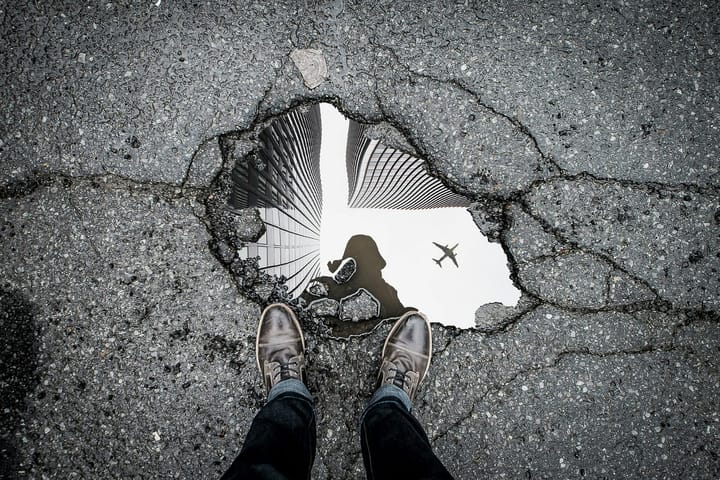Why a Stress-Free Life Isn’t the Best Life — My Journey of Realisation
A personal reflection on my life and how I’m still changing it.

What is your definition of a good life? One filled with bliss? One with a legacy to leave behind? Or one peaceful enough to sit by a lake and drink some tea? A few years ago, my answer would have been “a stress-free life”.
I always viewed life as something that’s thrown at me. I avoided putting in effort. I thought if I were “destined” for something, big or small, things would naturally flow. Passion? I’d naturally be good at it and not be stressed about small stuff. I looked at taking a walk or drinking tea as things done by those elitist “wannabes”.
But all this changed when I was pushed into the world to fend for myself. (It was mostly me arguing to move out and face the world, but that’s a different story.) I was forced to change, or else I’d be out on the streets. From managing my expenses to planning healthy meals, everything was in my hands. If something went wrong, I’d be facing a very different future than the current one, where I am writing this to you.
Even in these conditions, I somehow made it a rule to avoid anything stressful. Take playing a game of chess as an example; I avoided it because it drains my mental capacity, or going to a restaurant with friends was just a waste of energy and money. At my lowest point, I even felt people were too complicated. Looking back, I realise that I was an idiot.
I desired change but assumed it would be an external push. Unlike my favourite novels, nothing reality-shifting — no wise old man with a long beard showed me my path. I had to force myself to take up tasks. Looking back, I was extremely lucky to find a good job and a few good friends, but ultimately, I was useless to everyone, including myself. I only saw some worth in me when I started throwing myself at challenges. Not the grand, life-changing ones but those simple ones, like learning to cook or cleaning my place. These small steps made me realise the meaning of the word satisfaction.
How is this relevant to stress, you ask?
Everything I described happened because of the flawed goal I mentioned at the beginning: a beautiful, stress-free life. I chased work-life balance, thinking it’d lead me to a stress-free life. Ultimately, I realised everything I had been doing wrong. A stress-free life isn’t one devoid of stress. It’s one where you prepare for it.
Even this wasn’t an instant realisation. I’ve followed every “guru” I encountered, read many books that gave me profound formulae for happiness, and did everything they suggested. I woke up at 5 AM daily; I took cold water baths in winter like a lunatic — none of these help. (I still don’t understand why I thought taking a cold water bath could make me a good data scientist.)
After months of doing this, I realised that most of the answers to our questions were simple. We just didn’t like them. You want good health? At least go on a daily walk or join a gym. Good work performance? Make an effort to stay up-to-date on your field daily. Passionate job? Find something curious in the work you do. Sit through an intense game of chess. Force yourself to take up a task.
Is it going to be beneficial?
Yes. Not only do you reach your goals, but you also have some added benefits, like slower ageing and improved cognitive function. Ultimately, you evolve to meet the challenges you face. Am I the one saying this? No. The research points to this.
Don’t get me wrong, the long, chronic stress your boss induces is bad for you. Stress from a family emergency is bad from multiple viewpoints. I’m focusing on something different. On your normal day, I ask that you take up minor stress. Like travelling once a year, participating in a local competition, learning something new (painting, drawing, guitar, etc.), or striking up conversations with random people (not the TikTok ones, normal conversations). Even surprising an old friend is a good challenge. These tiny things give life meaning.
If you want something to do immediately, making a journaling habit is also a minor stressful activity. Writing your journal when you are exhausted is more stressful than you think. Choose the right things that matter to you, and move forward.
Ultimately, what gives us happiness is not a life without stress but one filled with meaningful stress. The stress you feel before speaking with the girl you like, the stress you feel before going to an interview or the feeling of facing a boss at 5% HP has meaning and purpose. Some of these might feel foolish and beautiful when looking back, while others relieve you of the day-to-day stress. Realise what’s causing you the uncomfortable feeling. Accept why you took up the task in the first place, and internalise the feeling of stress. Take some meaningful breaks to re-orient yourself to your goals. That’s the only way we achieve a “stress-free” life.
I’ve said everything I wanted to say, but many more want to share interesting insights about this topic. I haven’t changed yet. I still don’t go for a daily walk, but I’m pushing myself to. It’s still hard to digest that effort is a process, not some one-step magic.
I hope you found something meaningful in this article. If you did, share those tiny stresses you will take up now. If you’re not convinced yet, check out the resources I’ve added below. They helped me a lot, and I hope you find them valuable, too.
Thanks for staying till the end. Follow The Story Taste for more interesting discussions! Until next time — happy reading.
Resources
Online Links
- Stress Can Be a Good Thing If You Know How to Use It — Alia Crum and Thomas Crum, Harvard Business Review.
- Why Zero Stress Shouldn’t Be Your Goal — Jamie Ducharme, Time.
- “Good stress, bad stress” — Dr. Firdaus Dhabhar, Stanford Medicine Center
- Good Stress: What Are the Benefits? — Amanda MacMillan, health.com
- When Stress Is Good for You — Sue Shellenbarger, Wall Street Journal
- To Relieve Stress, Try More Stress — Dan Ariely, Wall Street Journal
Books
- Anti-Fragile — Nassim Nicholas Taleb
- Mindset — Carol S. Dweck


